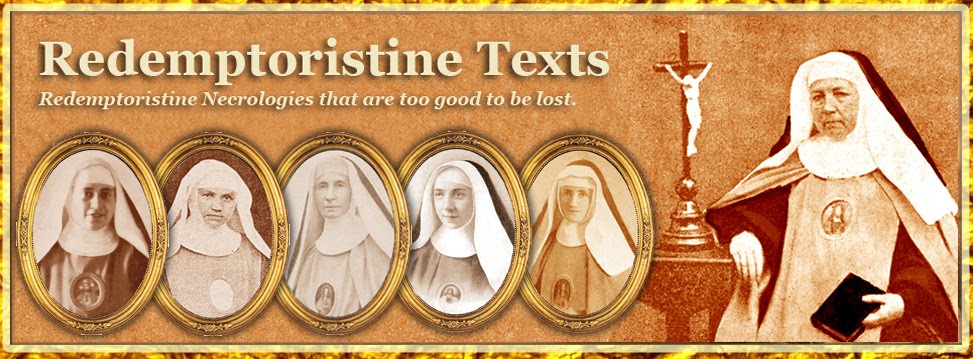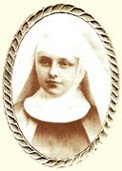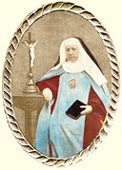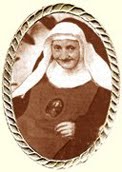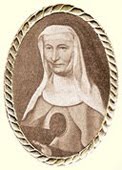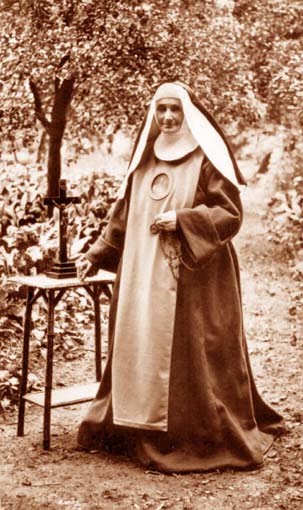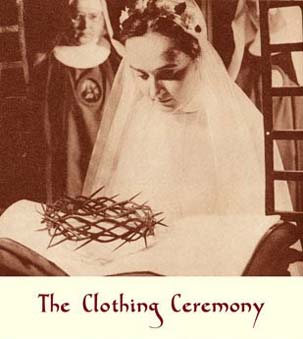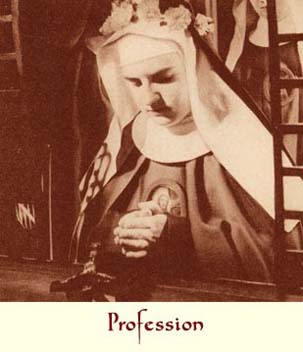Foundress of the Convent of the Redemptoristines of Velp, near Grave, founded in 1858
Chapter VI. The zealous Superior.
Sister Marie-Cherubine, in view of the little esteem she had of her own person, had in no way dreamed of becoming the Superior of the new foundation, but it was soon evident that the choice was a most happy one.
The reader will remember that, at the time of her profession, Sister Marie-Cherubine had received this addition to her name: “of the Holy Spirit”. More than ever now she had need of the lights of the Holy Spirit, so more than ever she addressed herself to this divine consoler to implore His help, and she unceasingly had recourse to this “Father of the poor, distributor of the heavenly gifts.” This is what she said one day in a meeting she had with one of her daughters. “We must often invoke the Holy Spirit with confidence,” she said, “and thus we shall always obtain light and strength in one manner or another.” Full of confidence in this powerful protector, Mother Marie-Cherubine had accepted the task that obedience had imposed on her. It was most especially during the beginning of her superiority that she had need of this confidence and this entire abandonment to the dispositions of the divine Providence, for, as in every new foundation, she often had to overcome great difficulties. “The poverty of the convent,” said one of the foundresses, “was, in the beginning, very pressing, and we lacked even the most necessary things, but Mother Marie Cherubine was always full of abandonment to the will of God. Calm and resigned, she sought her strength and consolation in prayer.”
She had the greatest zeal for the observance of the Rule, as far as it was then possible. She herself gave the example of it, and so all her daughters competed ardently in the accomplishment of their duties, inspired as they were even more by the good example of their Mother than by her words.
Early in the morning, when the community awoke, she was the first in the oratory, making the Way of the Cross, and during the day, one could be sure to find her in the chapel during her free moments. This spirit of prayer appeared most clearly in her zeal for the Divine Office. She would recite her breviary with great piety and great attention, she knew most of it by heart, and later on, when she had become almost blind, she could still lend her assistance when it was needed. During the novenas and octaves on the great feasts, she was completely plunged in the contemplation of the mysteries which were the objects of them. “Even the strongest of our Sisters,” one of her daughters avowed frankly, “could not pray in as continuous and devoted a manner as our Reverend Mother did.” The importance that she placed on prayer she showed one day on the occasion of her patronymic feast. She knew that the Sisters were preparing a surprise for her, and like a good Mother, she let them do it. “I will agree to everything, my children,” she told them, “provided that you do not neglect a single prayer because of it.”
Another proof that the spirit of prayer ruled in the little community of Velp is this passage from a letter from the Mother Superior of Bruges. “It is always with delight,” she said in it, “that I receive news of your house of Velp, as I believe, and I rejoice in it, that it is a sanctuary of piety, where you love and console our good Saviour.”
Mother Marie-Cherubine was also in the habit of conversing familiarly with God, and her heart was entirely consecrated to her Creator. One of her spiritual daughters, who had become the Superior of another community, one day received the following letter from her: “My dear and good Sister, so it has been given to me to engage a few moments with my best and former daughter, in whom I always take the most lively interest… I have not forgotten the beautiful and consoling feast of Pentecost that I spent with you. When praying for all of us, I also prayed for you, that the love of God may remain fixed in our hearts and that the divine Paraclete may be the only one to find entry into our souls, as He alone can lead us to Jesus, and make us know His love and the whole price of His grace. May He also make us always progress in love and piety towards the Blessed Sacrament, where He keeps and protects us here at Velp as much as at S. – A..!
“We know that it is Him alone who attracts us, and makes every sacrifice easy for us. May His Sacred Heart be the place of our reunion. Let us love one another mutually with a pure and sincere love, and let us help one another to live truly united in Him.
“What a joy it is for me to learn that M… is receiving good vocations! Generally speaking we can say that, in spite of the malice of the times, there are still many good souls. The good God is so merciful and so kind that the virtue and piety of a few souls make Him forget the wickedness of a thousand others. However, this does not exempt us from doing everything we possibly can to prevent evil. For you, as for us, I ask God for good and solid vocations. Last Saturday a good and talented young lady from Amsterdam made her entry here. She is 22. Thanks be to God, she has a good voice and a strong chest. I think she will be an excellent acquisition for us, as she seems disposed to everything…
“Here everything is going well. The garden looks very pretty. We have a good gardener. She knows neither pain nor weariness when it comes to procuring beautiful flowers for the Blessed Sacrament.
“I must leave you now, by good and dear Sister. The clock is calling us to Vespers. My sincerest greetings to all your good fellow Sisters.
“Ever in God, Jesus and Mary.
“I am in their love
“Your devoted Sister in Jesus Christ.
“Sister Marie-Cherubine of the Holy Spirit.”
Prayer ordinarily goes hand in hand with mortification, in such a way that it can be said: Those who pray well mortify themselves well. Mother Marie Cherubine was also a model on this point. Severe upon herself, she was not content with interior mortification, but also practised exterior or corporal mortification. She observed the feasts of the Church and those of the Rule with the greatest exactitude. Inspired by a great ardour for her own sanctification, she knew how to communicate this ardour to the hearts of her subordinates. She maintained the spirit of mutual charity which makes community life so agreeable. Like a true mother, she watched over the domestics of the house in order to ensure their well-being. Everyone who knew her and had any kind of dealings with her gave testimony of her that she was everything to everyone in order to gain them all for Jesus Christ. All the Sisters, without exception, felt happy under her wise and prudent direction, as she governed less by orders and constraints than by the heart. Always full of charity towards everyone, she knew, in the greatest adversities, how to preserve her natural good humour and remain always sweet and calm.
In the early days of the foundation, many things of prime necessity were lacking, and Mother Marie Cherubine could not always give her children the things they needed. Like a true mother, she wept more over them than over her own personal needs.
One day they found her weeping in the garden, weeping in secret before God because of the extreme necessity in which she found herself. Some of the Sister noticed her, and seeing that she was weeping, they asked her the cause of her sadness. “Oh!” she replied, “it is so painful for me not to be able to give my daughters what they need any more!”
Another time, they were woken up too early in the morning by the bell. Mother Marie Cherubine was the first to notice it, when she was already dressed. She immediately ran to all the Sisters to tell them that they still had one more hour of rest before them. As for herself, she went into the Oratory to spend that hour in prayer there,
She never departed from this manner of acting in all simplicity with her subordinates. It so happened, that through surprise or negligence, one or another piece of crockery was broken. The good Mother evidently did not give any evidence of satisfaction, which can be easily understood given the penury of the house. But then one day, Mother appeared in the kitchen, and in some sort of calamity she herself broke a brand new plate! The whole community was attracted by the noise and came running in all haste, excited by the novelty of the event, and realised with a scarcely restrained joy that it was Mother herself who had broken a plate! Then they all began laughing with all their hearts, and Mother herself was not the last one to do so.
It was always a sweet and agreeable task for her to spread her favours around her. But on the other hand, it cost her a great deal to have to be occupied by obligation with things disagreeable to corrupt nature, for example, having to hold a Chapter of faults. Then she had to do such violence to her good heart and her humility that the night beforehand she would not be able to sleep. The more she was convinced that no one had more need than her of being humbled, the more she regarded herself as the least and most imperfect of all the Sisters of the house!
She was a mother full of charity towards all without exception, and especially for the converse Sisters. She always had some very maternal things to say to them. And she could often be seen coming to their aid in their work, helping them to peel the potatoes, wash and prepare the vegetables, etc. “She considered herself as good for nothing.” This is the testimony given of her by a Sister who is still alive and has already been quoted in this notice.
This charity for her neighbour first of all embraced her spiritual daughters. But she also showed it in her conduct towards strangers who came to the house. She willingly entered into conversations with them, because she always had a few words of consolation to give them. However, she always regretted the time that she had to spend in the parlour.
Her pleasant and considerate manner of acting often helped her to gain the hearts of her postulants, and encouraged their parents to willingly make the sacrifice of a child, who, they said, would find such a good Mother in the convent. And when the postulants had decided to enter, she knew how to encourage them and strengthen them in their resolve in such a winning manner that they willingly made every sacrifice to hasten their arrival in the monastery. One day she wrote to a postulant: “Hasten to come to the abode of peace. You no longer have anything to do with the world. Jesus Christ is calling you.”
So it is in no way astonishing that so good and charitable a Mother was loved and venerated by her daughters, or that they lived happy and in peace under her gentle authority, and that the number of vocations gradually increased. And the buildings also had to be extended and various other changes made.
Let us not think, however, that there was any lack of crosses, or that everything prospered in the community. We shall soon see that God wished once again to open the royal road of suffering to Mother Marie Cherubine, and that she was thus to prepare her heavenly crown, as it is by all sorts of tribulations that we must enter into the Kingdom of God.
The means which God wished to make use of to test and purify His faithful servant was an eye infection that He sent her in 1865.
The reader will remember that, at the time of her profession, Sister Marie-Cherubine had received this addition to her name: “of the Holy Spirit”. More than ever now she had need of the lights of the Holy Spirit, so more than ever she addressed herself to this divine consoler to implore His help, and she unceasingly had recourse to this “Father of the poor, distributor of the heavenly gifts.” This is what she said one day in a meeting she had with one of her daughters. “We must often invoke the Holy Spirit with confidence,” she said, “and thus we shall always obtain light and strength in one manner or another.” Full of confidence in this powerful protector, Mother Marie-Cherubine had accepted the task that obedience had imposed on her. It was most especially during the beginning of her superiority that she had need of this confidence and this entire abandonment to the dispositions of the divine Providence, for, as in every new foundation, she often had to overcome great difficulties. “The poverty of the convent,” said one of the foundresses, “was, in the beginning, very pressing, and we lacked even the most necessary things, but Mother Marie Cherubine was always full of abandonment to the will of God. Calm and resigned, she sought her strength and consolation in prayer.”
She had the greatest zeal for the observance of the Rule, as far as it was then possible. She herself gave the example of it, and so all her daughters competed ardently in the accomplishment of their duties, inspired as they were even more by the good example of their Mother than by her words.
Early in the morning, when the community awoke, she was the first in the oratory, making the Way of the Cross, and during the day, one could be sure to find her in the chapel during her free moments. This spirit of prayer appeared most clearly in her zeal for the Divine Office. She would recite her breviary with great piety and great attention, she knew most of it by heart, and later on, when she had become almost blind, she could still lend her assistance when it was needed. During the novenas and octaves on the great feasts, she was completely plunged in the contemplation of the mysteries which were the objects of them. “Even the strongest of our Sisters,” one of her daughters avowed frankly, “could not pray in as continuous and devoted a manner as our Reverend Mother did.” The importance that she placed on prayer she showed one day on the occasion of her patronymic feast. She knew that the Sisters were preparing a surprise for her, and like a good Mother, she let them do it. “I will agree to everything, my children,” she told them, “provided that you do not neglect a single prayer because of it.”
Another proof that the spirit of prayer ruled in the little community of Velp is this passage from a letter from the Mother Superior of Bruges. “It is always with delight,” she said in it, “that I receive news of your house of Velp, as I believe, and I rejoice in it, that it is a sanctuary of piety, where you love and console our good Saviour.”
Mother Marie-Cherubine was also in the habit of conversing familiarly with God, and her heart was entirely consecrated to her Creator. One of her spiritual daughters, who had become the Superior of another community, one day received the following letter from her: “My dear and good Sister, so it has been given to me to engage a few moments with my best and former daughter, in whom I always take the most lively interest… I have not forgotten the beautiful and consoling feast of Pentecost that I spent with you. When praying for all of us, I also prayed for you, that the love of God may remain fixed in our hearts and that the divine Paraclete may be the only one to find entry into our souls, as He alone can lead us to Jesus, and make us know His love and the whole price of His grace. May He also make us always progress in love and piety towards the Blessed Sacrament, where He keeps and protects us here at Velp as much as at S. – A..!
“We know that it is Him alone who attracts us, and makes every sacrifice easy for us. May His Sacred Heart be the place of our reunion. Let us love one another mutually with a pure and sincere love, and let us help one another to live truly united in Him.
“What a joy it is for me to learn that M… is receiving good vocations! Generally speaking we can say that, in spite of the malice of the times, there are still many good souls. The good God is so merciful and so kind that the virtue and piety of a few souls make Him forget the wickedness of a thousand others. However, this does not exempt us from doing everything we possibly can to prevent evil. For you, as for us, I ask God for good and solid vocations. Last Saturday a good and talented young lady from Amsterdam made her entry here. She is 22. Thanks be to God, she has a good voice and a strong chest. I think she will be an excellent acquisition for us, as she seems disposed to everything…
“Here everything is going well. The garden looks very pretty. We have a good gardener. She knows neither pain nor weariness when it comes to procuring beautiful flowers for the Blessed Sacrament.
“I must leave you now, by good and dear Sister. The clock is calling us to Vespers. My sincerest greetings to all your good fellow Sisters.
“Ever in God, Jesus and Mary.
“I am in their love
“Your devoted Sister in Jesus Christ.
“Sister Marie-Cherubine of the Holy Spirit.”
Prayer ordinarily goes hand in hand with mortification, in such a way that it can be said: Those who pray well mortify themselves well. Mother Marie Cherubine was also a model on this point. Severe upon herself, she was not content with interior mortification, but also practised exterior or corporal mortification. She observed the feasts of the Church and those of the Rule with the greatest exactitude. Inspired by a great ardour for her own sanctification, she knew how to communicate this ardour to the hearts of her subordinates. She maintained the spirit of mutual charity which makes community life so agreeable. Like a true mother, she watched over the domestics of the house in order to ensure their well-being. Everyone who knew her and had any kind of dealings with her gave testimony of her that she was everything to everyone in order to gain them all for Jesus Christ. All the Sisters, without exception, felt happy under her wise and prudent direction, as she governed less by orders and constraints than by the heart. Always full of charity towards everyone, she knew, in the greatest adversities, how to preserve her natural good humour and remain always sweet and calm.
In the early days of the foundation, many things of prime necessity were lacking, and Mother Marie Cherubine could not always give her children the things they needed. Like a true mother, she wept more over them than over her own personal needs.
One day they found her weeping in the garden, weeping in secret before God because of the extreme necessity in which she found herself. Some of the Sister noticed her, and seeing that she was weeping, they asked her the cause of her sadness. “Oh!” she replied, “it is so painful for me not to be able to give my daughters what they need any more!”
Another time, they were woken up too early in the morning by the bell. Mother Marie Cherubine was the first to notice it, when she was already dressed. She immediately ran to all the Sisters to tell them that they still had one more hour of rest before them. As for herself, she went into the Oratory to spend that hour in prayer there,
She never departed from this manner of acting in all simplicity with her subordinates. It so happened, that through surprise or negligence, one or another piece of crockery was broken. The good Mother evidently did not give any evidence of satisfaction, which can be easily understood given the penury of the house. But then one day, Mother appeared in the kitchen, and in some sort of calamity she herself broke a brand new plate! The whole community was attracted by the noise and came running in all haste, excited by the novelty of the event, and realised with a scarcely restrained joy that it was Mother herself who had broken a plate! Then they all began laughing with all their hearts, and Mother herself was not the last one to do so.
It was always a sweet and agreeable task for her to spread her favours around her. But on the other hand, it cost her a great deal to have to be occupied by obligation with things disagreeable to corrupt nature, for example, having to hold a Chapter of faults. Then she had to do such violence to her good heart and her humility that the night beforehand she would not be able to sleep. The more she was convinced that no one had more need than her of being humbled, the more she regarded herself as the least and most imperfect of all the Sisters of the house!
She was a mother full of charity towards all without exception, and especially for the converse Sisters. She always had some very maternal things to say to them. And she could often be seen coming to their aid in their work, helping them to peel the potatoes, wash and prepare the vegetables, etc. “She considered herself as good for nothing.” This is the testimony given of her by a Sister who is still alive and has already been quoted in this notice.
This charity for her neighbour first of all embraced her spiritual daughters. But she also showed it in her conduct towards strangers who came to the house. She willingly entered into conversations with them, because she always had a few words of consolation to give them. However, she always regretted the time that she had to spend in the parlour.
Her pleasant and considerate manner of acting often helped her to gain the hearts of her postulants, and encouraged their parents to willingly make the sacrifice of a child, who, they said, would find such a good Mother in the convent. And when the postulants had decided to enter, she knew how to encourage them and strengthen them in their resolve in such a winning manner that they willingly made every sacrifice to hasten their arrival in the monastery. One day she wrote to a postulant: “Hasten to come to the abode of peace. You no longer have anything to do with the world. Jesus Christ is calling you.”
So it is in no way astonishing that so good and charitable a Mother was loved and venerated by her daughters, or that they lived happy and in peace under her gentle authority, and that the number of vocations gradually increased. And the buildings also had to be extended and various other changes made.
Let us not think, however, that there was any lack of crosses, or that everything prospered in the community. We shall soon see that God wished once again to open the royal road of suffering to Mother Marie Cherubine, and that she was thus to prepare her heavenly crown, as it is by all sorts of tribulations that we must enter into the Kingdom of God.
The means which God wished to make use of to test and purify His faithful servant was an eye infection that He sent her in 1865.
This necrology is translated from Fleurs de l'Institut des Rédemptoristines by Mr John R. Bradbury. The copyright of this translation is the property of the Redemptoristine Nuns of Maitland, Australia. The integral version of the translated book will be posted here as the necrologies appear.
